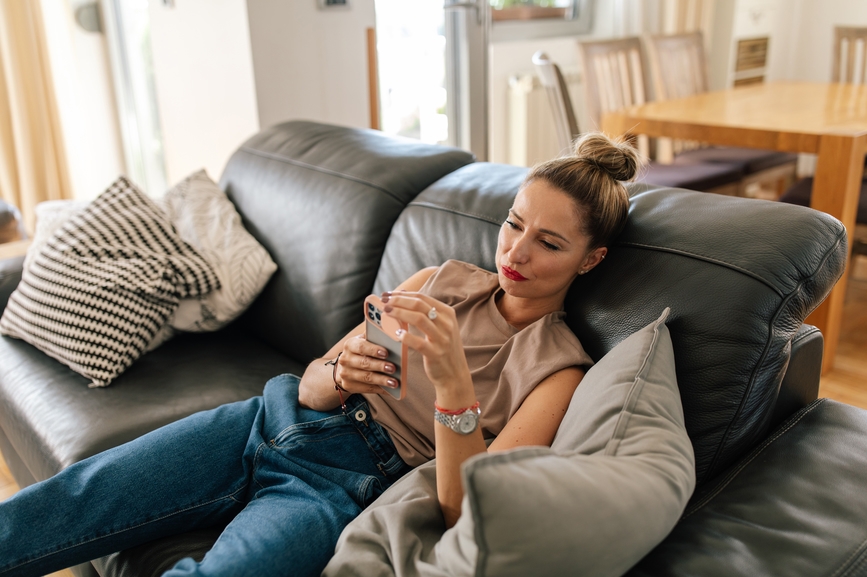Written by Ashley Kane,
Brightside Health
7 Minute Read

Medically reviewed by:
Erin O'Callaghan, PHD
Director of Therapy
10 Minute Read

Did you know that, for many people, there is a direct link between social media and anxiety? If you have ever felt like social media causes stress or increased anxiety, you are definitely not alone.
Social media isn’t inherently bad—there are many benefits of social media, from staying connected to advocating for important social causes to maintaining relationships with important people in your life. However, ignoring the potential negative impacts of social media prevents us from finding ways to cope with social media stress.
Let’s take a look at how social media impacts mental health.
Before we begin, we want to remind you that if you are experiencing anxiety or stress, talking with a mental health practitioner can be a huge help. Brightside Health is available to you.
Social media and mental health
Spending time scrolling Facebook, Instagram, and other social media platforms is a popular way to pass time. These platforms can be good ways to stay in touch with others and to stay up to date on the latest news.
Harvard’s McLean Hospital says, “Social media has a reinforcing nature. Using it activates the brain’s reward center by releasing dopamine, a “feel-good chemical” linked to pleasurable activities such as sex, food, and social interaction. The platforms are designed to be addictive and are associated with anxiety, depression, and even physical ailments.”
Many studies have shown that social media contributes to stress and anxiety among users. A series of recent papers have shown that social media is connected to depression and anxiety, particularly in young people, but it’s vital to know that nobody is immune to having these reactions.
Some of the aspects that can contribute to social media stress are:
- FOMO (Fear of Missing Out)
- False or unfair comparisons
- An inundation of filtered news (“doomscrolling”)
- Abuse from others
Concerns about social media: comparisons
Many people feel compelled to compare themselves to others in their social media feeds.
What we often forget, is that social media can only give us a glimpse into the lives of those around us, and will only reflect the news and attitudes that we have selected to receive. This can cause problems in terms of perception and comparisons.
Many who spend a lot of time on social media apps overlook the fact that most of what they see there is surface-level information. Think of this like looking at a duck swimming on a lake. Above the water, that duck is calm and serene, but under the water, its feet are paddling frantically. If you forget that those feet are also part of the duck, you may believe that a duck is only calm and serene.
Social media is the same way. The content that gets posted on social media is deliberately selected and then edited and altered to portray a purposeful image of who we are to the world. This might not reflect the nuance of real life at all. It can be so tempting to compare our own lives to what we see on social media sites, but that comparison is entirely unfair.
Social media will always be an unfair comparison because we can only see others’ serene and peaceful floating on top of the water, while we can only know our own feet furiously and frantically paddling under the surface. We never get unfiltered feedback about how we are perceived by others. We need to remember that we are comparing the entire continuum of our own experience to other people’s hand-selected highlight reel.
This comparison can also lead to a fear of missing out (FOMO). We might feel jealous, lonely, or left out if we aren’t living the exciting lives we see on social media. We don’t see the costs of those exciting lives; we don’t see the fear and the loneliness that others may be feeling or what they might be going through. It is always an unfair comparison between our inner experiences and others’ outer experiences.
These comparisons and FOMO reactions can cause users to feel depressed that their lives don’t stack up. The impacts of social media on areas of concern like body image, relationships, and communication have been well documented.
In this way, social media may exacerbate your experience of anxiety and depression disorders.
Concerns about social media: abuse
We often say things online we wouldn’t say in person. Many people who spend time on social media overshare personal information, leaving them vulnerable. This is particularly problematic because social media is remote and somewhat anonymous.
Distance can lead to a disinhibiting effect that can lead to bullying and other problems. People may say something very cruel or hurtful without worrying about the consequences—they may use the anonymity of social media to be abusive.
These abuses might range from microaggressions to full-fledged cyberbullying. A Pew Research study found that “59% of U.S. teens have been bullied or harassed online, and a similar share says it’s a major problem for people their age.” It should come as no surprise that abuse on social media can cause stress and anxiety.
Potential benefits of social media
Again, we want to stress that social media can be a very good thing in the lives of many people. Just a handful of the potential advantages include:
- Establishing and maintaining relationships
- Raising awareness about social issues or areas of personal interest
- Raising funds for important causes
- Providing a larger pool for social support and social connection
- Democratization of information sharing
A research study from Harvard expands on this:
We know that having a strong social network is associated with positive mental health and well-being. Routine social media use may compensate for diminishing face-to-face social interactions in people’s busy lives. Social media may provide individuals with a platform that overcomes barriers of distance and time, allowing them to connect and reconnect with others and thereby expand and strengthen their in-person networks and interactions. Indeed, there is some empirical evidence supporting this.
Tips for healthy social media use
Instead of cutting social media from your life, it’s most important to understand how social media may help alleviate or contribute to symptoms of depression and anxiety.
Here are some tips for using social media that can help you avoid social media stress:
- Pay attention to how social media makes you feel. Try to be mindful of when it’s helping you connect with others versus when it’s causing you distress.
- Track your screen time. Take breaks and hold yourself accountable to change if you notice your screen time gets out of hand. (You can also ask a friend or someone you live with to help out here.)
- Turn off notifications. When your phone lights up with a notification, it’s hard to avoid picking it up. Turning off notifications that aren’t important can help you cut down social media time.
- When you feel the need to check social media, consider trying a mindfulness app instead. This might not feel easy at first, but if you pause and think about why you’re about to open social media (Are you avoiding a difficult emotion? Are you simply bored?), you might choose a mindfulness app to fulfill that need instead.
- Talk to a mental health professional. Licensed therapists can help you with goals and give you tips for coping with difficult emotions. If you’re feeling down, anxious, or stressed, know that support is available. We all need help sometimes.
If you are experiencing stress and anxiety, get started with Brightside.













